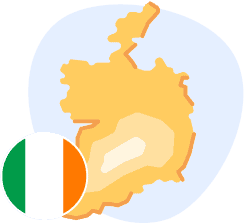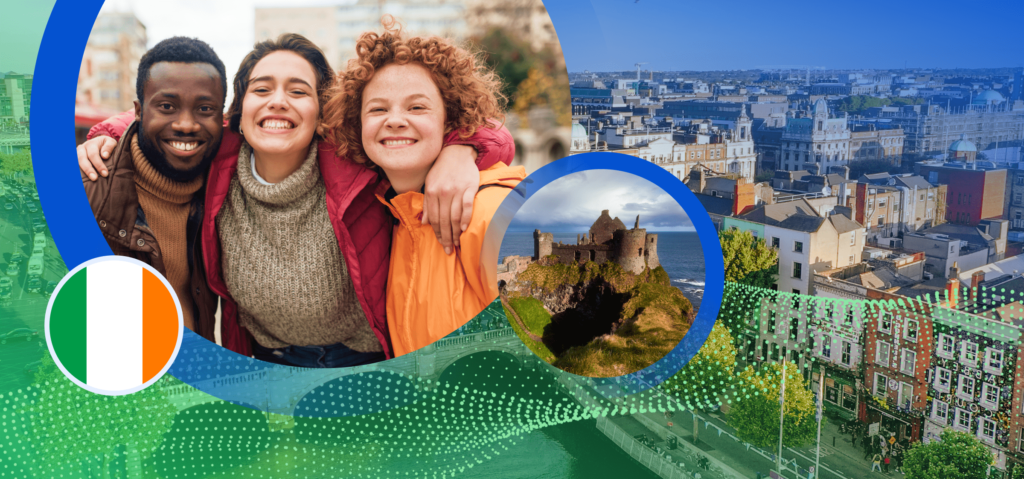When preparing to study abroad in Ireland, part of the application process for some international students is to complete an interview. If you’re selected to complete one, your visa officer will let you know after you’ve submitted your visa application paperwork. Studying abroad requires commitment, and the officials want to be sure you’ve prepared for this opportunity. Read on to learn more about how you can prepare for an Ireland student visa interview.
You can learn about study and career opportunities in Ireland directly from our study abroad experts! Register for our free webinar on June 22, 2023 to get answers to your top questions.

Why Are There Interviews?
Irish post-secondary (or third level) institutions, including technical institutes and universities, want to make sure international students are coming to Ireland to study. Some people pose as international students, but really intend to work abroad. After arriving in Ireland, these folks either fail to register, or register and don’t attend class. So, this interview, usually done at a Visa Facilitation Services (VFS) centre, helps prove to the government that you’re genuinely going to study.
The Irish education system is unique. Read our blog to learn about the different types of third level institutions, NFQ levels, and how you can prepare for academic success.

How Should I Prepare for the Ireland Student Visa Interview?
After You’ve Been Selected
Once a visa officer tells you that you’ve been selected for an interview, it’s time to start preparing. Gather the supporting documents (and any translations) that you included in your visa application. You’ll want to bring those to your interview. Ensure each document is printed out and filed in a folder, so they’re easy for your interviewer to look at.
Also, start thinking about the questions you might be asked, and practice your answers with a friend or family member. Saying the answers out loud will help you be more confident in the interview. Plus, when you practice, your friend or family member can point out where you can improve, or where more detail is helpful.
The Day Before
The day before, review your document folder to ensure you’ve got everything. Check your travel route for construction or detours. Also, decide what you’ll be wearing and wash or iron it if needed—last-minute outfit changes could make you late. While a full suit or formal dress will turn heads, those outfits are too fancy. Equally, wearing shorts and a t-shirt might make your interviewer think you’re not serious. Find a happy medium with business casual clothes.
Interview Day
On the day of the interview, arrive at the centre a little early (10-15 minutes is good). Also, try to have a good sleep the night before, so you’re rested and alert.
Want to learn how to get an Irish student visa? Check out our blog.

What’s the Ireland Student Visa Interview Like?
Each interview’s questions and timing will vary. In general, it’s an in-person, one-to-one interview that usually covers the following:
Your Knowledge of the Course
Think about how the course you’re going to take fits your career goals. Know a few of the classes you’ll be taking, if there’s a co-op or internship, and why you’ve chosen this course. That way, if you’re asked about why this course, or why now you can answer confidently. Specific, thoughtful answers will score you points.
How You’ll Support Yourself Financially
You’ll talk about your financial backgrounds (and your family’s), and how you intend to support yourself. Also, know the minimum amount of money you’ll need to support yourself each year. This figure changes regularly, so check reputable sites like those of the Irish government for updates. For example, for courses starting after July 1, 2023, and which are a year or longer, you must show you have immediate access to at least €10,000. You must also show that you and your sponsor(s), if applicable, have ready access to €10,000 or more for each subsequent year of your studies, plus course fees for each of those years.
Your Immigration Intent
Focus on the present, and your studies. Eligible international students in courses ranked 8–10 on Ireland’s National Framework of Qualifications (NFQ) scale may work in Ireland after graduation, thanks to the Third Level Graduate programme. However, talking too much about work and too little about your study plans could make your interviewer doubt you actually plan to study in Ireland.
Bonus Tip: Much like a job interview, this interview is also testing your communication skills. If you miss something the interviewer asks, don’t feel bad if you have to ask them to repeat a question once or twice. However, don’t expect that you can ask for every question to be repeated without losing marks. The interviewers know it’s stressful, but they want to make sure you can take care of yourself in an English-speaking environment.
Because visa interviews can feel like a job interview, also consider these interview tips for international students.

Interview Question and Answer Strategies
Here are some common interview questions, and ways you can approach them, plus key details the interviewer might be looking for. That said, always make your answer your own—nobody can tell your story the way you can!
Why did you choose to study in Ireland, vs. studying or working in your home country?
- Share how your studies will help you find work in your home country.
- Talk about why you chose your college or university, and speak to its strengths. You might mention its first-class research environments, access to field materials in libraries, or fieldwork with a renowned instructor.
- Share examples of job opportunities and salaries in your field that you could get after studying abroad. Compare those to roles you’re currently eligible for.
What are your test scores (i.e.: TOEFL, IELTS, MCAT, etc.), what is your GPA, and what are you like as a student?
- Bring copies of your test results and transcripts to the interview, for reference.
- While test results are important, they aren’t the whole picture. You can speak about your community service or athletic achievements as well.
How are you funding your tuition and living expenses?
- You may need to share exact tuition costs, so look it up on the ApplyBoard Platform.
- If family members are supporting you, know their yearly salary, their employer, and full job title.
- Have an idea of what your monthly rent, food, and insurance will cost. Many institutions list cost-of-living averages on their website. Use those numbers to shape your budget.
Will you return to your home country after graduating?
- This question assesses your intentions. Because student visas are non-immigrant visas, it’s important to share that you plan to leave Ireland after your studies end.
- Mention some companies back home you plan to apply to post-graduation, or discuss how you’d like to make an impact in your field.
Don’t forget: there are scholarships for international students in Ireland that can help fund your studies.

You’ll be one step closer to achieving your dream of studying abroad when you complete your Ireland student visa interview. With practice and careful preparation, you’ll be sure to make a positive impression.
Looking for more info? Check out our Study in Ireland student guide.



